It seemed that the journey to Pemba would be quick and not very interesting. A 40HP engine had to push us directly to the island without using the sail. The men who had contacted us with the captain reassured that around midnight we would reach the destination.
The engine failed a few seconds after starting. The anchor was already on board and the tide was pulling our boat out of the crowded harbour bay. Fruitlessly trying to restart the engine, the crew managed to get out to open waters crashing with only two other boats and barely missing third one. Then the sail went up.
We were two wazungu on board. The other one was a German girl, whom we met walking the road while going to the harbour with Karl. She had no idea where to go then and thought that going to Pemba would be a good idea. Anika spoke a bit of Swahili and was my only channel of communication with the crew and other passengers, as no one of them spoke English.
Surprisingly, we went northwards. The boat stopped at some other tiny fishing harbour north of Tanga. A few passengers joined us and the crew rushed ashore to find food. The strict rules of Ramadan gave little time to eat before the daytime fast would start again.
We spent a couple of hours waiting for the tide to turn again. The crew shared their food with us, and soon we sailed eastwards, on the main leg of the journey.
The boat leaked and the sailors constantly took turns in pouring the water out with a huge bucket. For us, the passengers, there was not much to do, except for sleeping. The crowded deck offered very little space and occasionally a wave sprayed over right board, forcing someone to move. A morning rain was more just and made all of us equally wet and cold.
Before noon we saw land on the horizon, but slowly passing along beautiful beaches we reached the village of Tumbe at 2PM, only 12 hours later than initially planned.
The Zanzibar Archipelago is absolutely dominated by Muslims and because of Ramadan all the restaurants were closed. Bananas and cookies were the only readily available meals, but to eat them one had to find a desolate place not to annoy the locals.
I quickly retreated to a mzungu enclave. Following a recommendation from other cycling traveller, I went to a cyclist-friendly place and not moved away from there for a couple of days. That was my long-awaited rest from Africa, among people who came there for diving after a safari in Serengeti or Kilimanjaro climb. I went with them to the sea to snorkel. The unspoiled reef displayed rich variety of colorful fish and with strong currents the underwater landscape was constantly changing.
Sitting there, I checked my email. A surprising message came from a friend, informing me that there were some Polish people living on the island, just a few kilometers away. I called them and soon moved into their guest tent located in a beautiful tropical forest.
Iwona and Marek had a long story to tell. Having left Poland three decades ago, they lived a good life in South Africa before deciding to sell everything and move to the tropical island. They acquired a prime plot, close to a forest reserve and with a long front on Vumawimbi beach. They are now looking for an investor willing to join their project and build the first luxurious, eco-friendly hotel on Pemba. Anyone fancy?
My generous hosts not only offered a great place to sleep and fed me with incredibly rich food, but also helped to cure a sore tooth. Their veterinary skills were already highly valued by the locals, for whom they had been running a free clinic.
I would love to stay there for at least a week, but time was pressing me to go. Just before the Eid al-Fitr I gave up the idea of finding an overcrowded board and bought an overpriced ticket for the fast ferry. Cycling to the harbour of Mkoani, I turned into wrong road around Chake. Before I realized it after a few kilometers, it was already dark, so I camped in a nearby bush.
The night passed peacefully but while I was rolling the tent, someone spotted me and instantly reported the finding. Two soldiers arrived soon and informed me that I had camped on a military area and had to be at least interrogated.
Another two arrived, asked a bunch of questions and told that I had to wait again for someone else. Such situation repeated again and again and after two hours there was a small crowd of soldiers standing around and every newcomer asked me about the same things.
Finally it was decided that the military procedure had finished and I would be “handed over to the civil authorities”, which meant packing me into a car and driving to a police post. I hope you will forgive me using motorized transport over these few kilometers. I offered to cycle after the car, but my request was denied.
The police officer was surprisingly friendly and after looking at my ticket for the ferry leaving in less than two hours time, he just released me wishing a good journey. A 30km race over steep hills, which I did in an hour and a half, concluded my visit to the island. The ferry whisked me away and soon I landed at the town of Zanzibar.
An advantage of that tourist place was the availability of coffee served behind a curtain. Otherwise the religious rules were strictly observed and even a bottle of soft drink was sold to me wrapped in a paper bag. Anyway, I was relieved to leave the town where words “hello my friend” can be heard way too often.
Very soon I contacted Michał, with whom I had travelled some weeks ago. The same evening we were on the eastern coast of the island, together with him and his girlfriend. Three lazy days passed too quickly on plainly doing nothing.
The tourist market on Zanzibar is already well developed and the ban on camping makes things a bit complex for low-budget travellers. We managed however to use our own accommodation, but gave up idea of extensive exploration of the island.
The Ramadan eventually finished. With hope of eating something more than clandestinely made chapati with jam, we left the cosy beach towards Uzi Island. That tiny piece of land is connected to the main island with a road, which is passable only during low tide.
When we arrived the tide was high and no food was available for sale. During Eid al-Fitr the meals were eaten only at home. But there was a friendly local man, who invited us home for delicious pilau and later helped to bargain accommodation prices in a seaside resort.
We crossed the dry sea bottom the next day around noon, just to find a sleepy and rather uninteresting village on the other side. A sudden shower came and went, leaving us wet on a football field. We sat there, cooking dinner and occasionally chasing the kids away when they invaded our private space. Then, out of the blue, a woman came to sit nearby with a bowl of homemade food for sale. Then another one arrived, and another...
Accidentally we stopped in a place where the villagers used to meet and eat after the fast had ended. There was a plenty of local snacks, kids enjoyed sorbets and a group of fishermen grilled octopuses. The feast lasted until the night and finished as suddenly as it had started. Then we retreated into nearby bush, to sleep undisturbed.
Having used the next low tide to cross the sea, we turned back to Stone Town. We had been planning to get a dhow to Bagamoyo, but the port guard told us that passengers were not allowed on them due to bad weather conditions. Indeed, the sea was quite rough and most of the passengers of the overnight ferry to Dar es-Salaam were busy with feeding fish instead of sleeping.

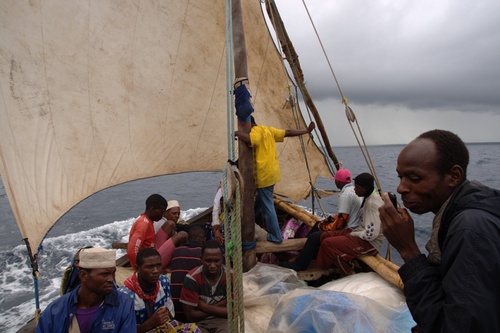
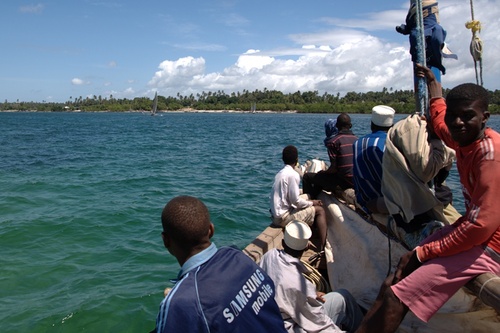
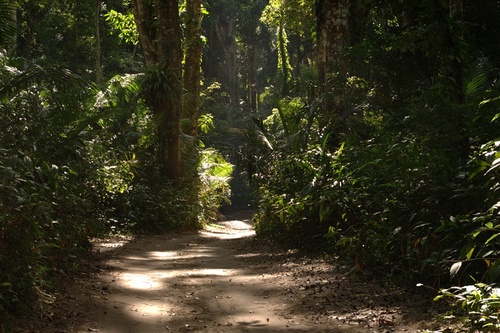
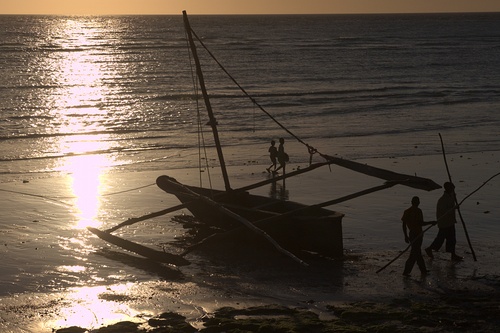
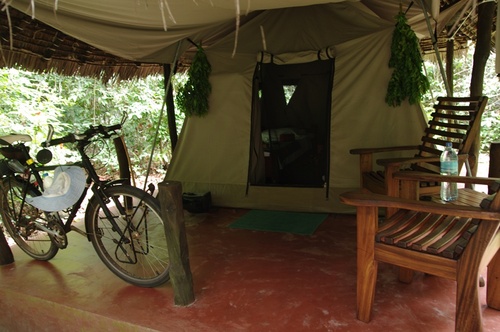
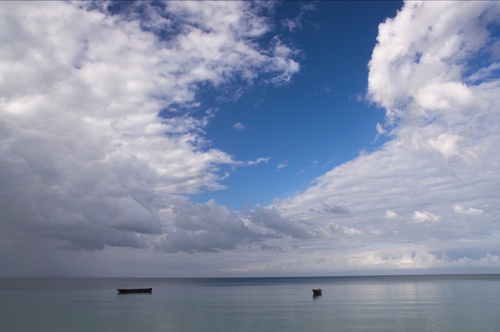
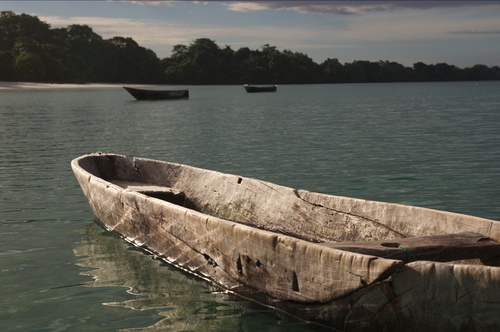
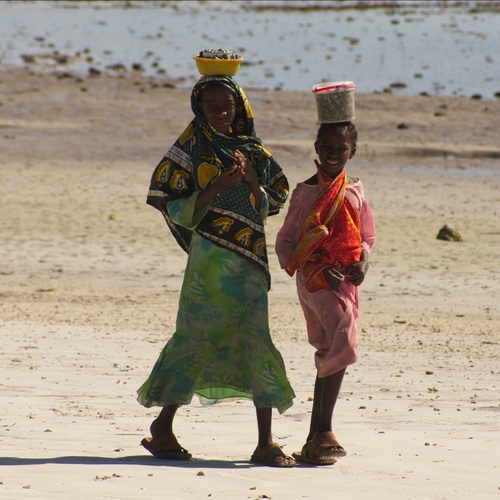
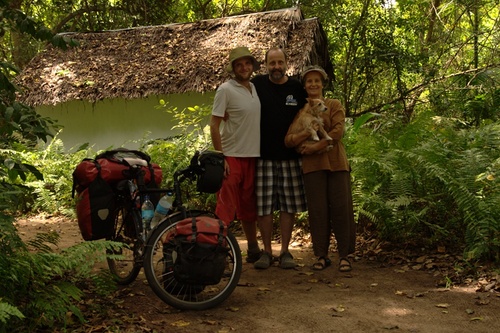
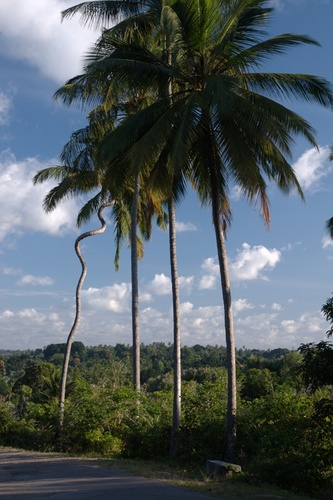
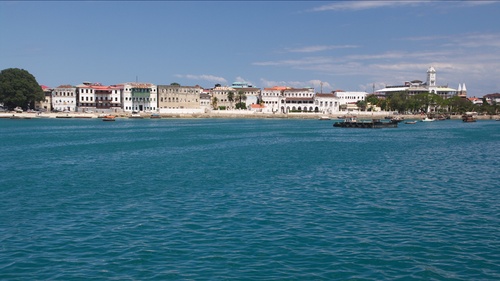
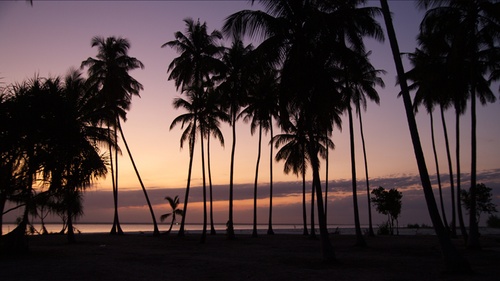
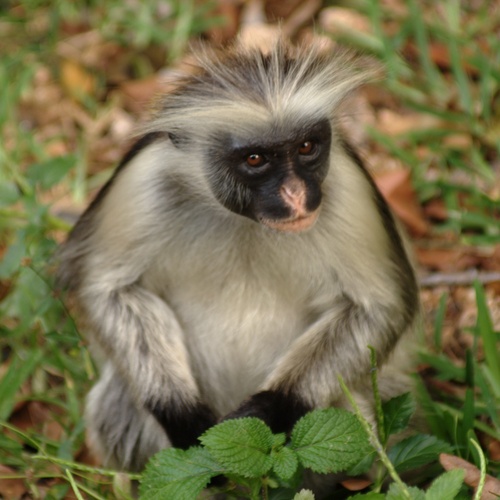
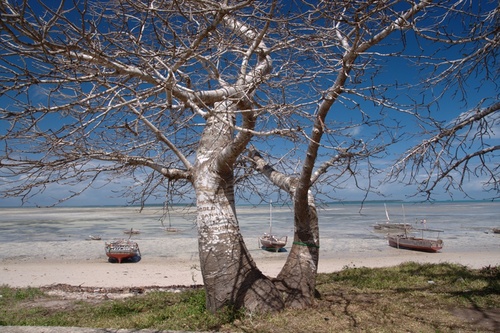
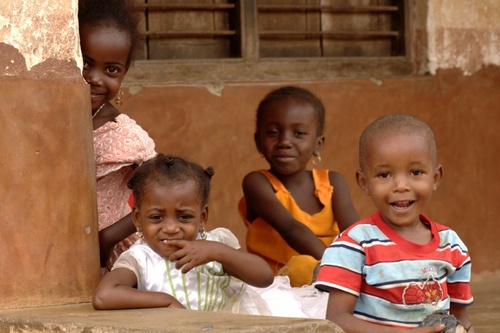
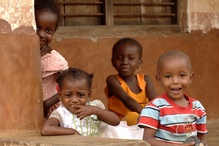
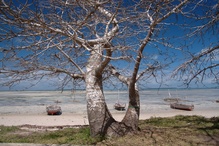
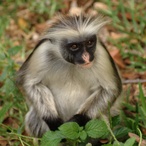
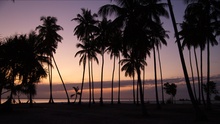
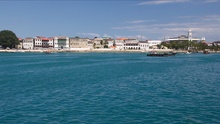

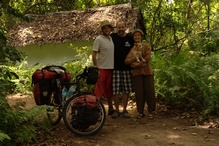
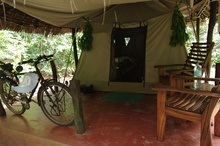
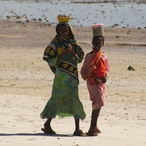
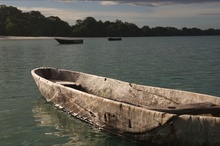
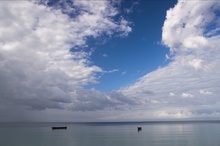
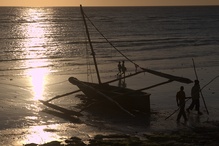
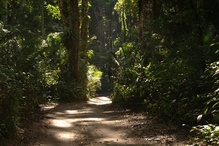
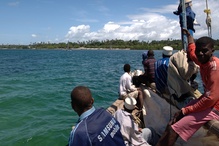
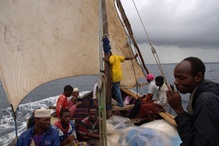
Comments:
Miśka
Igor Sroczyński
Moje podróże wydają się niczym przy tym przedsięwzięciu.
Wyczekuję kolejnych wpisów i życzę jak najlepszych dalszych dni wyprawy.
Pozdrawiam.
Issa Yusufu Wamungu
Pity I didn't know of you before you cycled through and past my country Kenya.
Good luck!